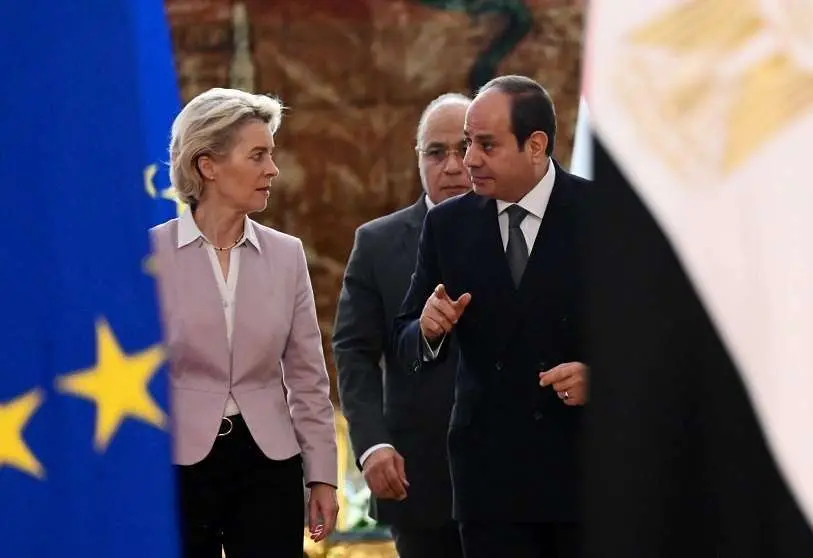Israel, Egypt and EU sign a deal to import Israeli gas from Egypt

The European Union, Israel and Egypt signed a memorandum of understanding in Cairo on Wednesday to supply Israeli natural gas through the North African country. "With this agreement we will work on the stable supply of natural gas to the EU from the Eastern Mediterranean region," European Commission president Ursula von der Leyen said on her Twitter account, stressing that the memorandum "will contribute to our energy security".
According to a press release issued by the Israeli Energy Ministry, the three parties pledge to cooperate to boost Egyptian, Israeli and other supplies to Europe based on the Arab country's liquefaction infrastructure. Tel Aviv will link its supply to Egypt, which will be delivered by ship to Europe in the form of liquefied natural gas, but the two will also be able to export their resources to other customers.
The memorandum, which is valid for three years, after which it will be automatically renewed for another three years, includes several climate clauses, whereby the parties commit to cooperate in reducing methane and carbon emissions during these shipments.

The press release does not specify how Israel will transport its supplies to Egypt, but previously Von der Leyen, currently visiting Egypt after a two-day tour of Israel, mentioned the construction of a gas pipeline, saying it could also be used for hydrogen shipments in the future.
The Commission President stressed the importance of such an agreement in helping Europe's partners wean themselves off Russian dependence. "The Kremlin has used our dependence on Russian fossil fuels to blackmail us. And since the beginning of the war, Russia has deliberately cut off gas supplies to Poland, Bulgaria, Finland and Dutch and Danish companies in retaliation for our support for Ukraine," von der Leyen said in a speech at Ben-Gurion University on Wednesday. "But the Kremlin's behaviour has only strengthened our determination to free ourselves from dependence on Russian fossil fuels," the German politician continued.
Moscow has recently demanded that all countries it considers "hostile" pay for Russian natural gas imports in roubles, and has cut off supplies to all those that have refused to accept this scheme.
On Tuesday, Russian gas giant Gazprom announced that it would temporarily reduce shipments through the Nord Stream pipeline to Germany by 40%, and on Wednesday Eni, Italy's leading energy company, reported that Russian gas shipments to the country had dropped by 15 %. In addition, there are fears that the Kremlin could permanently cut off supplies to Europe in response to the sanctions, jeopardising the EU's energy security.
Good meeting with President @AlSisiOfficial.
— Ursula von der Leyen (@vonderleyen) June 15, 2022
We need to work together to prevent a major food security crisis in the region.
Now, the EU is providing €100 million to support people and farmers in ??.
Together, we will mobilise a strong global response. https://t.co/vo4HfksFhs
Brussels, for its part, has pushed ahead with plans to significantly reduce Russian fossil fuel imports, with firm agreements to limit purchases of products such as oil and coal. But natural gas has been the elephant in the room during European sanctions rounds, due to Moscow's heavy reliance on several capitals. The Commission plans to reduce Russian gas imports by up to two-thirds by the end of 2022, and a total blockade by 2027, but there is no firm agreement on this.
Russian natural gas imports account for up to 40% of the EU-27's total, and are an important source of revenue for Moscow. To replace this dependence, EU partners have proposed boosting energy transition and seeking new suppliers.
The EU has already reached agreements to increase supplies of liquefied natural gas from sources such as the US, Qatar and Australia, and now this project will allow for the arrival of significant exports of Israeli and Egyptian gas.

Israel is fast becoming a major regional producer of natural gas, while Egypt, which also has ample quantities of gas, is home to a large gas liquefaction capacity, thanks to the Damietta and Idku plants, which together can liquefy some 12.2 million tonnes per year.
However, official sources estimate that these quantities will take at least two years to reach, so this agreement is unlikely to help Brussels significantly reduce Russian gas imports by the end of this year. At the same time, the lack of regasification infrastructure on the continent, which is essential for shipping liquefied natural gas, raises doubts about the viability of the deal.
The European green pact establishes the reduction of European natural gas consumption by 25% by 2030 and fully by 2050, which, if fulfilled, will mean a cut-off date for these shipments.








